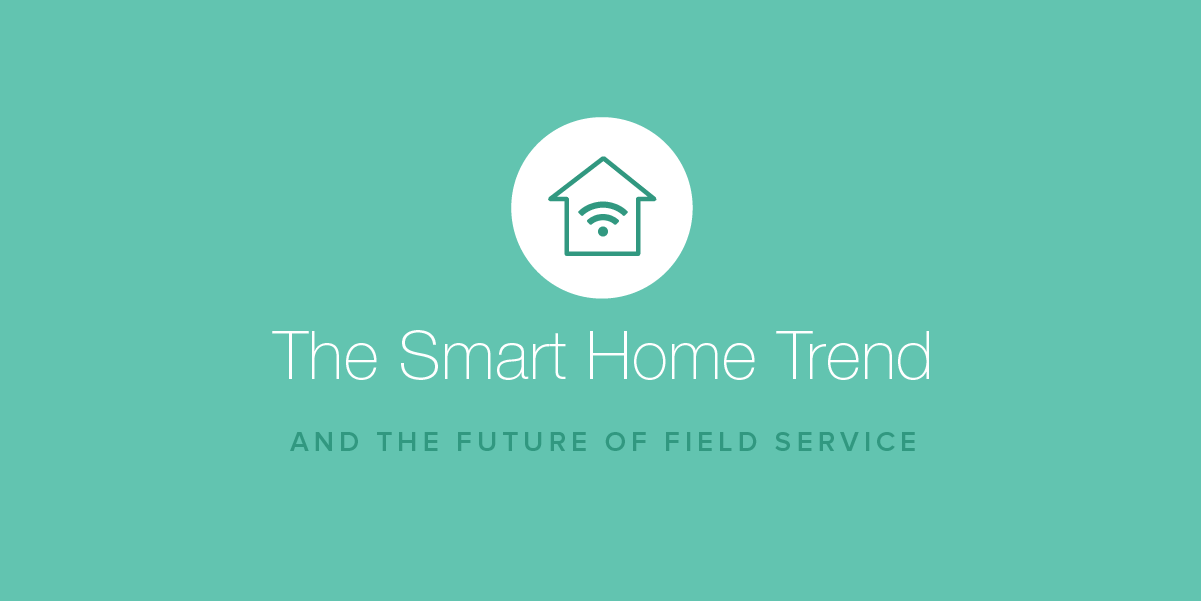The Smart Home Trend and the Future of Field Service
- September 24, 2018
- By: Vonigo
More and more homeowners and even renters are buying into the smart home trend. New technologies that help to automate homes are coming online all the time.
This gives forward-thinking field service companies a new opportunity to embrace the technology and lead with innovations of their own.
We’ll take a look at some of the innovations already taking place that can transform your living quarters into a smart home. And we’ll even look at some of the brands and products available now. Ready to embrace the future?
The Rise of the Smart Home
When Nest launched the first smart thermostat in 2011, there was plenty of buzz. Some people were understandably excited about what it represented. Few could have predicted that it would set off a smart home trend. Many wondered what all the fuss was about. After all, it’s just a thermostat.
But on the heels of the Nest launch came more and more tech innovations for the home. Voice-activated assistants, smart appliances and many other items connected to the internet of things (IoT).
Here, we take a look at some of the most buzzworthy smart home innovations and highlight the implications for each in the field service industry.
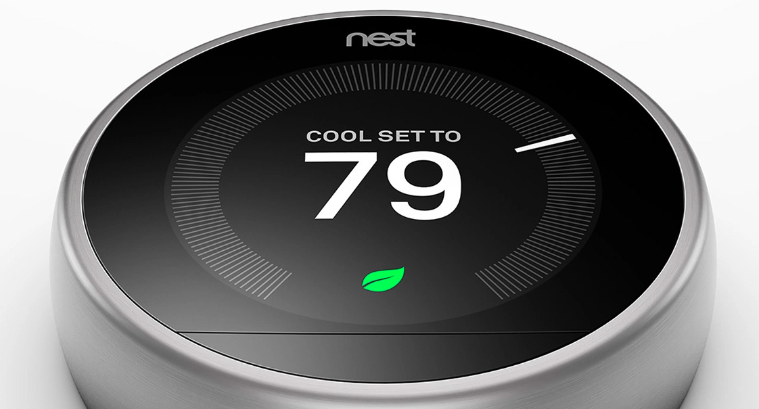
Smart Thermostats
We start here because, in some ways, these are the items that are helping to drive this smart home trend. Smart thermometers have become wildly popular, despite being what is otherwise an unexciting household item.
Control your home’s heat or air conditioning with an app, or better yet, let the unit “learn” how to best control your home’s temperature based on usage. Using motion sensors and the proximity of smartphones, these thermostats can tell when no one is home and adjust the heat accordingly. This features helps to save a lot on heating costs and has massive implications for the environment as well.
Field Service Opportunities
New tech means new opportunities for installation and service of that tech. HVAC companies, electricians, and other home services companies can embrace the new technologies and get a head-start on their competition by leading the way with smart appliances and converting existing houses into smart homes.
Popular Brands of Thermostats
Google Nest: It was two Apple alumni who first designed the Nest thermostat, and many other players have sprung up in their wake. And it’s no surprise, given that Google paid $3.2B to acquire Nest in 2014.
Ecobee: They make a number of different models with different features, namely the ability to connect with voice-activated home assistants (see below for more info on these).
Honeywell: Like other smart ‘stats, it has an away feature, but with a twist. Instead of sensors in your home itself, it uses geofencing. When you venture outside of its range (e.g. 500 feet), it activates away mode. Enter back into range and it turns back on, meaning that your home can be warm by the time you arrive home.
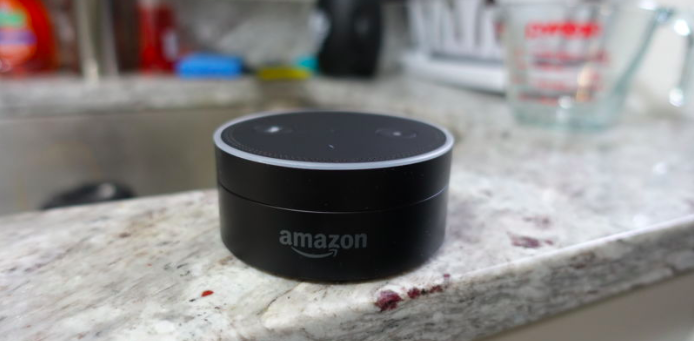
Voice Assistants
While a lot of the technology in this list has the ability to transform a house into a smart home, the voice assistants are what bring it all together. Most of the tech we’re discussing here will have integrations with these voice-controlled assistants. These are the “butlers” of the future.
Want a little more light in your living room? “Siri, open the blinds.” Need a little mood music? “Ok Google, play my business time playlist on the stereo.” Out of toilet paper? “Alexa, order me some 3-ply.”
As the smart home trend continues, these assistants will cement their place at the center of our lives. Even without smart devices, they can already handle a lot of tasks in the existing forms (either a smartphone or other hardware device like Amazon Echo).
How Field Services Can Benefit
For many field service industries, the ease with which a company can book with you can make the difference between winning the booking or not. Is it time to have a voice-activated booking strategy? Are there special considerations or services you can offer customers who have their homes wired for automation?
It’s early days on this one so far, but it won’t be long before we’re booking window cleanings with a few simple voice commands while standing with our hands on our hips looking out a less-than-spotless window.
Popular Voice Assistant Hardware
Google Home: “Get answers, play songs, tackle your day, enjoy your entertainment and control your smart home with just your voice,” says Google. Control your Nest, Phillips, and Wemo appliances by speaking commands to your Google Home or Google Home Mini Pod.
Amazon Echo: Alexa is the name of the “assistant,” but Amazon’s hardware pods are called Echo. Alexa has the most market share in the space, owing to Amazon’s ability to sell things. And we’re not just talking about selling Echos. With an Amazon Prime account, you can place orders for anything Amazons sells, just with the sound of your voice.
Apple Home: Home works a little differently, in that your mobile device is the only hardware you need to control your other appliances. “Ask Siri to turn off the lights from your iPhone. See who’s at the front door on your iPad. Control things remotely with the help of Apple TV. Even tell your new HomePod to turn up the music. The Home app makes all your connected devices work harder — and smarter — for you.”
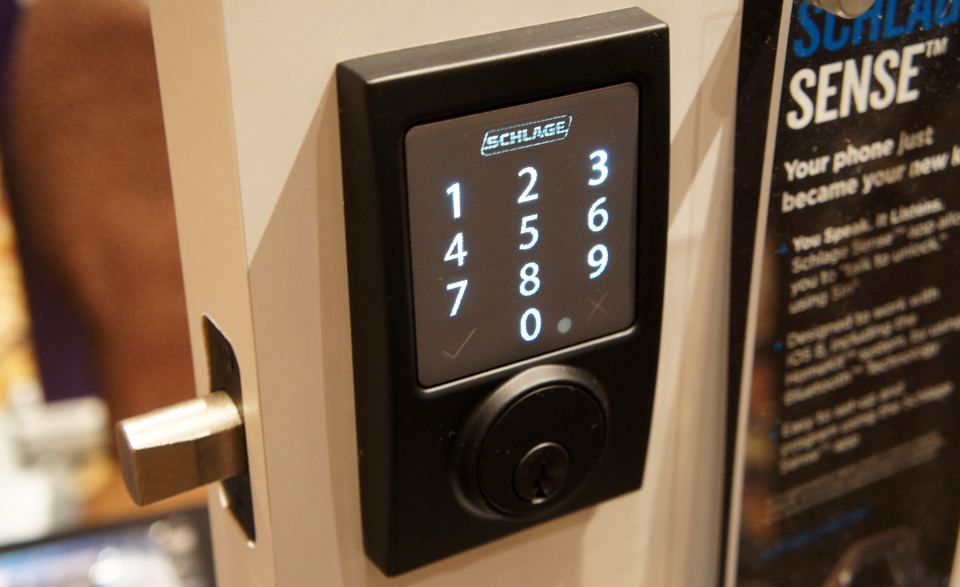
Remote Control Door Locks
Of all the items on this list, this is the one that has had the biggest impact on the field service industry already.
No more hiding a key under the mat for the cleaners. Remote door locks sync with your smartphone and an app can be used to control when your door unlocks. And you don’t even need to go to the trouble of entering a code. Some models will unlock the door for you using Bluetooth or NFC as your phone approaches. What a time to be alive!
Field Service Opportunities
Savvy locksmiths are already hip to this trend on the sales and installation front. Smart door locks are a bigger ticket item than their analog counterparts. But other home services can benefit too. House cleaners, for example, can make arrangements to access the homes of customers with remote door locks.
Simply by understanding how the technology works and training your teams to work with it, you can gain an advantage over your competition.
Popular Brands of Remote Door Locks
Schlage Sense: These models sync with Apple Home Kit. That means you can tell Siri to unlock the door for you and feel like George or Jane Jetson. It has a deadbolt and a built-in alarm, and you can assign several phones to it.
August Smart Lock Pro: Works with Siri, Alexa, and Google Assistant. Just speak to lock to your door, and watch a manifest of the comings and goings on your doorstep in an activity feed.
Kwikset Kevo: Works with your phone iOS and Android), and lets you set up a set of “digital keys” for multiple users. Need to revoke that access? The primary user can perform a system reset in just ten seconds.
Appliances
Everything from washers and dryers, fridges, stoves, lamps and more are already available with smart features. For the appliances that do not have these futuristic upgrades, you can add hardware devices that will help you control them with voice assistants and the like.
Phillips Hue: These smart lighting options can wake you up in the morning, help you get energized for your morning, greet you when you come home, and help you wind down at night. With bulbs, lamps, fixtures and other accessories, you can always have just the right lighting for the mood or the time of day.
Wemo: When your appliances aren’t already smart, you can use a Wemo accessory to make them so. Plug a Wemo accessory into a socket, and then control the device. Belkin’s Wemo line makes smart plugs, switches, and dimmers for lights and other appliances that don’t have them. Now, not just your lighting, but your aquarium, coffee maker, fans, and heaters can all switch on based on your preferred settings.
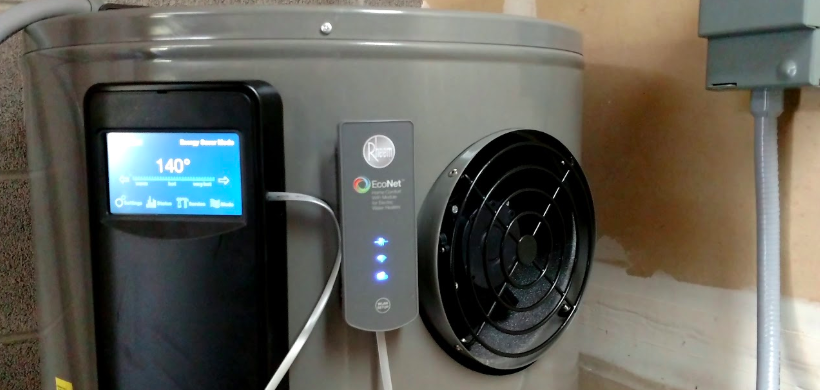
Hot Water Tanks and Heaters
Smart hot water tanks and heaters are one of the best ways to save on energy costs. A smart hot water tank, for example, can connect to your mobile device for adjustments and alerts like leak detection. Hybrid heat pumps save costs on unnecessary heating, providing “on-demand” hot water.
Some Brands of Smart Water Tanks and Heaters
Rheem: These units can provide on-demand hot water, and adjust for more volume during peak times as well. Rheem claims that units pay for themselves in two years’ time, due to the energy savings alone.
AO Smith: They make higher end water tanks and heaters, and have apps for iOS and Android that can connect to multiple units. If you manage a large complex with multiple units, you can monitor the status of all of them at once.
Smoke and Carbon-Monoxide Alarms
Smart smoke alarms do one thing especially well: notify you when they’re triggered. If you’re at work, and your home is on fire, it can give you peace of mind to know that you’ll know right away. If you’re making a stir-fry in the kitchen and the alarm is false, no more climbing a ladder to deactivate it. You can silence the alarm from an app as well.
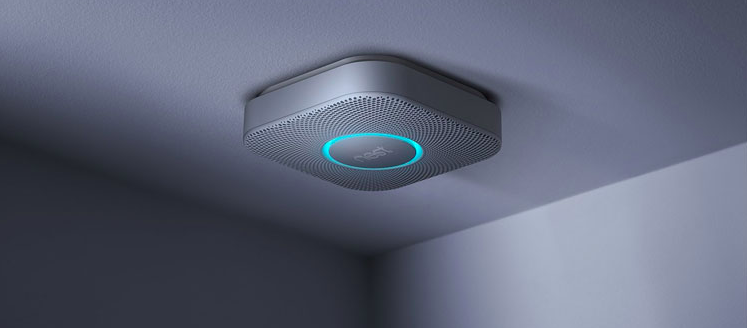
Some Smart Smoke Alarm Brands
Nest Protect: Here, once again, Nest makes an industry-leading product, the Protect. It tests itself, lasts up to a decade, and can tell the difference between smoke and CO. But best of all, it will warn you with a human-sounding voice if all it senses is a bit of smoke from the popcorn you’re accidentally burning on the stove.
Birdi: They bill it as “better than a smoke alarm.” Birdi’s models also detect air quality, so if you’re being exposed to smog or smoke that you can’t see, you’ll know. It claims to be able to predict the weather with pinpoint accuracy and will warn you about pollen spikes, allergen outbreaks, harsh UV and more.
Netatmo: “Unlike traditional smoke detectors, the Netatmo Smart Smoke Alarm eliminates this worry by providing smoke alert warnings in real time, whenever smoke is detected, straight to you and your family’s smartphones.” And it’s got a 10-year battery promise too.
Service Opportunities for Smart Appliances and Alarms
It’s easy to dismiss these innovations as self-managing, and leave it at that. Why does a smoke alarm with a 10-year guarantee need servicing, for example? But there are still opportunities to explore. These appliances have the ability to store and communicate extremely valuable data in real time. Things like whether there’s a flood or the house is on fire, or there’s a break-in attempt.
Consider selling service packages that respond to these kinds of emergencies. Water tank leak? The customer’s app can alert the restoration company. Someone’s at the door that doesn’t belong there? Sounds like a job for a local security company with people-power in the neighborhood.
The Internet of Things
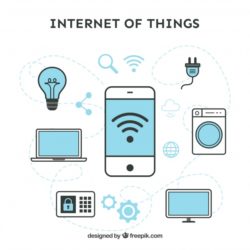 Many of the items discussed here are part of what is considered the internet of things (IoT). IoT is the sum total of all of the devices and appliances that are capable of connecting to the internet to share and store data.
Many of the items discussed here are part of what is considered the internet of things (IoT). IoT is the sum total of all of the devices and appliances that are capable of connecting to the internet to share and store data.
We’ve written about IoT before, and the popularity of connected devices continues to grow. The ability of devices in the home to record and share data will continue to develop, and as prices drop, to become more popular.
The analysis of that data will help manufacturers and homeowners alike make adjustments that suit their homes and lifestyles better.
Voice-Activated Booking for Field Service Companies?
Right now you can control any manner of items in your home with your voice alone. You can order products online simply by speaking words. How long before you can book home services with voice commands alone?
Sure you can dial a number hands-free already. But what will the future be like when customers can book appointments for things like cleaning and junk removal by simply speaking a voice command at a voice assistant pod or smartphone?
We are watching this space with interest, and enjoy being the cutting edge of technology for homeowners and service providers alike.
Online Booking for Field Service
Customers demand convenience. If they can order a pizza without even touching a phone, they should also be able to book their mobile services with ease. For now, they’ll have to use a form on their smartphone or computer. But they can have their voice-activated assistant remind them of your arrival, unlock the door for you with their deadbolt app, and even have the heat come on before you arrive.
Want to learn more about how field service software with online booking can help you grow your business by tapping into a new customer market? Book a free, private demo of Vonigo.
